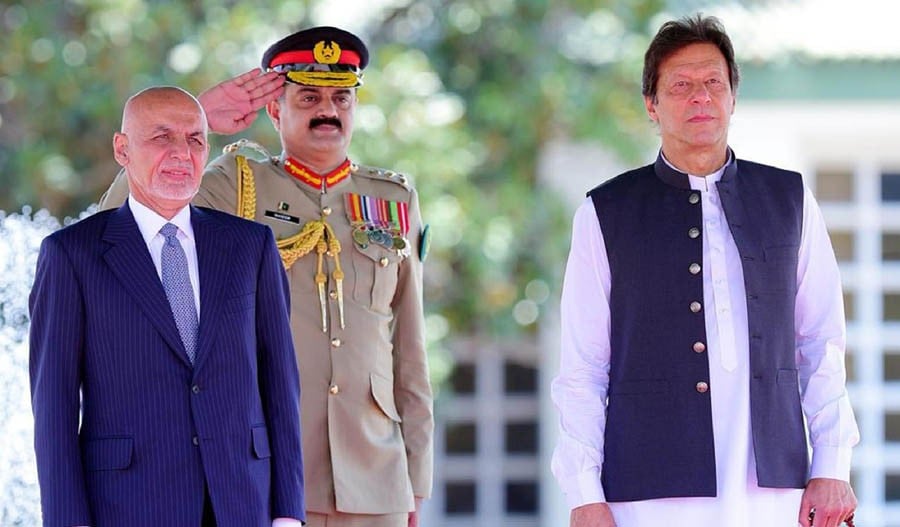
The ongoing peace talks in Qatar and Islamabad’s engagement with Kabul offer a prospect of gains for all stakeholders

On June 22, dozens of Afghan politicians visited Pakistan for two days and participated in what was known as "Lahore process". The meeting, in the run-up to Afghan President’s visit to Pakistan, covered trade, economy, health and the repatriation of Afghan refugees. Held in Bhurban, Murree, the meeting didn’t have any Taliban representative, however.
On 27 July, Afghan President Ashraf Ghani came to Pakistan for a two-day visit, his third since 2014. Among other things, Ghani must have discussed with Prime Minister Imran Khan the role Pakistan can and should play in reining in, and forcing Taliban to talk to the incumbent Afghan government directly. Afghan governments since 2001 have routinely accused Pakistan of providing sanctuaries to Taliban who orchestrate attacks inside Afghanistan. A delegation of Taliban will meet Imran Khan. As confirmed by White House, on July 22, Prime Minister Imran Khan will visit Washington and meet President Donald Trump. What do these events tell us?
Apparently, the Afghan government’s interest in Pakistan stems from the latter’s influence with the Taliban. The Afghan government would definitely have demanded Pakistan force Taliban into talking to the government in Kabul. Up to now, the Islamist militia has resisted any pressure to talk to representatives from the Ghani administration. In September, Afghans are going to presidential polls and, in his reelection bid, Ghani intends to sell to the Afghan voters the success of a potential peace deal with Taliban.
Pakistan has its own reasons to welcome the Afghan leaders from across the government opposition divide. First, along with the use of coercive means, the Pakistani policymakers have, at times, relied upon the soft means of diplomacy to minimise the Indian influence at the court of Kabul. Secondly, Pakistan wants to mend its strained relations with the US which has, at times, accused Pakistan of sheltering Taliban.
Hosting the Afghan leaders in the country and even meeting, in future, with Taliban in Pakistan with the prior consent of the Afghan government, Imran Khan has tried to assuage the American concerns vis-à-vis Pakistan’s role in making peace in Afghanistan at a time when he is going to meet American President Donald Trump at the White House on July 22.
Apparently, there is an emerging realisation in the corridors of power that Islamabad’s friendly relations with Beijing should not be at the expense of Islamabad-Washington relations. Despite the rise of China mainly as an economic giant, the US wields enormous political and economic clout, and technological edge that surpass that of China’s and Pakistan can hugely benefit from what the US can offer on these counts. Since 1954, Pakistan, has been the beneficiary of the US financial and technological assistance in return of its geostrategic services in 1950s, ’80s and 2000s. If Pakistan leaves the US in favour of China, India will only benefit at the cost of Pakistan.
Taliban will also meet Prime Minister Imran Khan. For one, when required by Pakistan, the militia is hardly left with any other choice. For another, the success of talks means the withdrawal of foreign troops from Afghanistan, an enduring demand of the militant militia since it was ousted from power back in 2001. Regional states, such as Pakistan, Iran, Russia and China also cherish the prospect of foreign troop withdrawal from Afghanistan. The ongoing peace talks in Qatar offers a prospect of gains to all stakeholders.
In an interview with Al Jazeera, American peace envoy for Afghan peace and reconciliation Khalilzad claimed that progress had been made on all elements: counter terrorism assurances from Taliban, the withdrawal of all foreign troops, an intra-Afghan dialogue including an agreement on a roadmap for the political future of Afghanistan and a comprehensive ceasefire. The US interest is an Afghanistan which doesn’t shelter international terrorist organisations such as al Qaeda. Taliban, Pakistan and almost all regional states want foreign troops out of Afghanistan. Afghan citizens long for a peaceful future for their country.
What should Pakistan do?
In international politics, it is only realistic to not put all eggs in one basket. Friendship with both China and the US without allowing either to impact the other is only a rational choice. Similarly, relying too much on Taliban has done more harm than good to Pakistan. India has capitalised upon the Afghan alienation from Pakistan. Engaging with the Afghan government and its political opposition should continue. The more Pakistan distances itself from Taliban, the more Islamabad will, in all probability, win over Afghans. Space for India will shrink.
Once again, Pakistan has the opportunity to switch over to a civilised behaviour indealing with its weaker western neighbour. Akhtar Abdul Rehman’s policy of "Kabul must burn" during the days of anti-Soviet resistance must give way to Kabul must prosper." A new beginning is overdue.